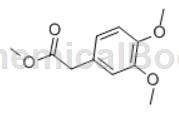Background and overview[1][2]
Methyl 3,4-dimethoxyphenylacetate, also known as methyl homoveratrate, can be used to synthesize the beta-blocker bevantolol and the antiarrhythmic drug verapamil. verapamil), etc., are also key intermediates in the synthesis of isoquinoline alkaloids. The traditional synthesis method is to react 3,4-dimethoxybenzyl chloride with cyanide to obtain 3,4-dimethoxyphenylacetonitrile, and then hydrolyze it to obtain 1. This route requires the use of highly toxic cyanide. Another synthesis route is to use 3,4-dimethoxybenzaldehyde as raw material, condense it with nitromethane to generate 3,4-dimethoxy-β-nitrostyrene, and then reduce it with potassium borohydride and oxidize it with DMSO. be made of. The price of raw materials and reducing reagents for this route is higher, and the production cost is higher.

Methyl 3,4-dimethoxyphenylacetate
Apply[3]
Preparation of 3,4-dimethoxyphenylacetic acid phenanthroline gadolinium(III) complex:
Dissolve 0.59g (3mmol) methyl 3,4-dimethoxyphenylacetate and 0.40g (2mmol) 1,10-phenanthroline (phen) in 20ml absolute ethanol; take another 0.45g (1mmol) Gadolinium nitrate Gd(NO3)3·6H2O is dissolved in 10ml of absolute ethanol, and slowly added dropwise to the above solution while stirring continuously. Precipitation soon appeared. Continue stirring for 2 hours, filter, and wash the product with ethanol and then dry naturally to obtain a powdery solid with a yield of about 70%. The filtrate evaporates naturally at room temperature, and after 25 days, colorless bulk crystals suitable for single crystal analysis are obtained. The product is filtered, washed, dried, and collected.
Elemental analysis of powder sample C84H82Gd2N4O24 (Mr=1846.04), experimental values (%): C, 54.40; H, 4.41; N, 3.01; Gd, 16.93. Calculated value (%): C, 54.65; H, 4.48; N, 3.04; Gd, 17.04. The content of metal gadolinium is determined by the ignition constant weight method. When synthesizing europium-doped (2%, 6% and 10%, mole fraction) 3,4-dimethoxyphenylacetate gadolinium(III) complexes, the number of moles of each rare earth nitrate is calculated by Accurately weigh the relevant RE(NO3)3·6H2O solids, mix them and dissolve them in absolute ethanol. The specific synthesis steps and methods are the same as above to obtain the doped complex powder. X-ray powder diffraction analysis shows that the XRD patterns of the pure 3,4-dimethoxyphenylacetate gadolinium (III) phenanthroline complex are consistent with those of the doped sample, indicating that the molecular structure of the doped complex has not changed. .
Preparation[2]
Ethyl 1.3,4-dimethoxyacetophenonate
Add anhydrous aluminum trichloride (14.7g, 0.11mol), methylene chloride (110ml) and 2 (13.8g, 0.10mol) into a 250ml neck bottle equipped with an electric stirring and tail gas absorption device, stir evenly Slowly add oxalyl chloride monoethyl ester (15.0g, 0.11mol) dropwise in an ice bath, and complete the dropwise addition within about 30 minutes. Remove the ice bath, react at room temperature for 6 hours, then heat to about 35°C for 4 hours. After the reaction was completed, the mixture was cooled in an ice-water bath, water (100 ml) was added, and the organic layer was separated. The aqueous layer was extracted with dichloromethane (30ml×2), and the organic layers were combined. Washed with 5% sodium bicarbonate aqueous solution (50ml×2) and water (80ml×2) in sequence, dried over anhydrous sodium sulfate and filtered, the filtrate was concentrated to dryness under reduced pressure, and the residue was recrystallized from cyclohexane to obtain a light yellow solid. 3,4-Dimethoxyacetophenonate ethyl ester (20.8g, 87.3%), mp 35~36℃.
1HNMR(CDCl3,400MHz)δ:7.64(d,J=8.4Hz,1H,ArH), 7.57(s,1H,ArH), 6.93(d,J=8.8Hz,1H,ArH),4.45( q,J=7.2Hz,2H,CH2CH3),3.98(s,3H,OCH3), 3.95(s,3H,OCH3),1.43(t,J=7.2Hz,3H,CH2CH3).
2.3,4-Dimethoxyphenylacetic acid
Add ethyl 3,4-dimethoxyacetophenonate (17.9g, 0.075mol), ethylene glycol (60ml) and 85% hydrazine hydrate (22.1g, 0.375mol) into a 250ml three-necked flask. Slowly increase the temperature to 120°C and react for 2 hours. After cooling to room temperature, add potassium hydroxide (12.6g, 0.225mol), heat to 180°C, evaporate the low boiling matter while raising the temperature (about 2h), and then reflux for 4h. After the reaction is completed, cool to room temperature, add 6mol/L hydrochloric acid (about 30ml) and adjust to pH 2~3. Add water (150 ml), extract with ethyl acetate (50 ml × 4), and combine the organic phases. After washing with water (50mL , 73.4%), mp95~96℃ (document [7]: 96.2~97.5℃).
1HNMR(DMSO-d6,400MHz)δ:12.23(brs,1H,OH),6.87(d,J=8.4Hz,1H,ArH),6.85(s,1H,ArH),6.76(d,J =8.0Hz,1H,ArH),3.72(s,6H,OCH3),3.48(s,2H,CH2).
3.3,4-Dimethoxyphenylacetic acid methyl ester
The target product 3,4-dimethoxyphenylacetic acid methyl ester can be obtained by esterification and condensation of 3,4-dimethoxyphenylacetic acid and methanol.
Main reference materials
[1] Yao Guoxin, Chen Gang, Lu Yong, & Zhu Jintao. (2010). New synthesis process of 3,4-dimethoxyphenylacetic acid. Chinese Journal of Pharmaceutical Industry, 41(10), 730-731.
[2] Xu Hui, Jiang Yuren, Chen Fangjun, & Ma Guanjun. (2009). New synthesis method of 3,4-dimethoxyphenylacetic acid. Guangzhou Chemical Industry, 37(1), 39-41.
[3] Yu Yuye, Liu Jianfeng, Li Huaqiong, & Zhao Guoliang. (2010). Synthesis, crystal structure and fluorescence spectrum of 3,4-dimethoxyphenylacetate-phenanthroline ytterbium (Ⅲ) complex. Physical Chemistry Journal of Chinese Journal of Science and Technology, 26(6), 001535-1540.



 微信扫一扫打赏
微信扫一扫打赏
